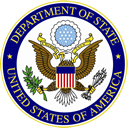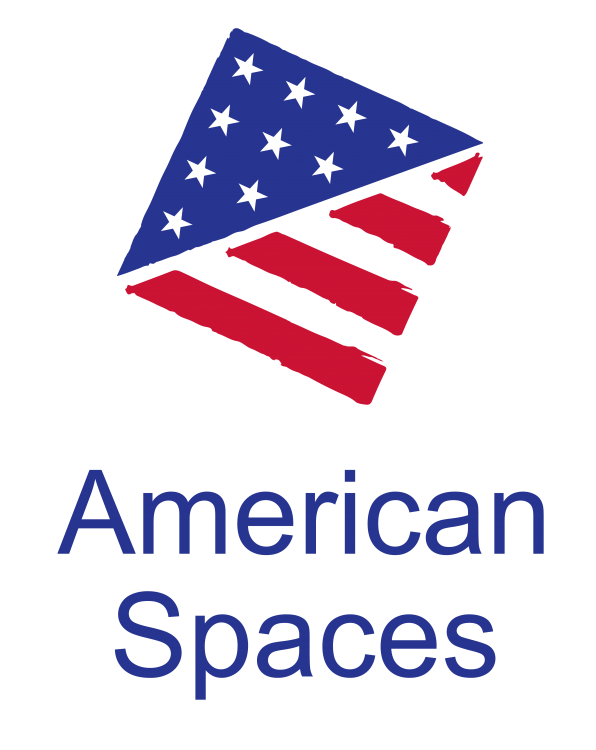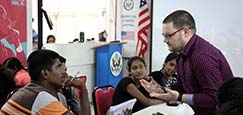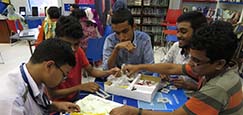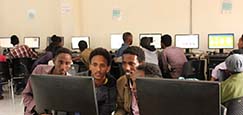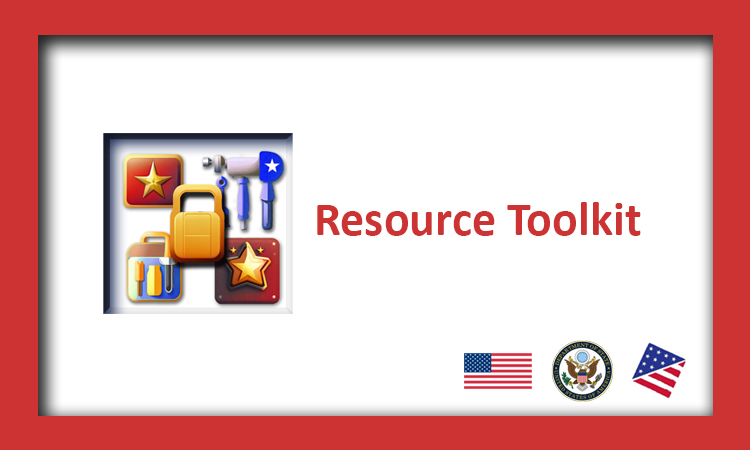COMMERCIAL DIPLOMACY
PROGRAM TOOLKIT FOR AMERICAN SPACES
This toolkit is designed for programming at American Spaces to connect foreign consumers to American brands, goods, and services; facilitate American business access to local supply chains and talent; and advocate for a business climate that provides mutual benefits for both American business and foreign country audiences.

KEY DEFINITIONS
American Chamber of Commerce (AmCham): An American Chamber of Commerce is an organization that represents U.S. businesses in other countries. It helps U.S. companies connect with local businesses, navigate foreign markets, and understand local laws and regulations. (Source: U.S. Chamber of Commerce)
Commercial Diplomacy: The practice of using diplomatic efforts to promote trade, investment, and economic partnerships between nations. (Source: International Trade Administration)
Critical Minerals: Mineral resources that are essential to the economic or national security of the United States and have a supply chain that is vulnerable to disruption. (Source: U.S. Geological Survey)
Export: The process of selling goods or services produced in one country to buyers in another country. (Source: Department of Commerce)
Foreign Agricultural Service (FAS): Part of the U.S. Department of Agriculture, the FAS helps American farmers and businesses sell their food and agricultural products in other countries through the work of roughly 140 Agricultural Officers in more than 90 countries. (Source: Department of Agriculture)
Human Capital: The skills, knowledge, and experience of people that contribute to economic productivity. In commercial diplomacy, investing in human capital—such as through training programs or education—can help build a skilled workforce, support innovation, and create opportunities for collaboration between U.S. businesses and local populations. (Source: Organisation for Economic Co-operation and Development)
Import: The process of buying goods or services produced in one country from sellers in another country. (Source: U.S. Food and Drug Administration)
Intellectual Property (IP): Legal rights that protect creations of the mind, such as inventions, designs, and trademarks. (Source: World Intellectual Property Organization)
Intellectual Property (IP) Attaché Program: The U.S. Patent and Trademark Office (USPTO) places intellectual property (IP) attachés in U.S. embassies and consulates around the world. These experts work with foreign governments, businesses, and organizations to improve IP laws and systems to ensure fair treatment of U.S. businesses’ innovations and creations in global markets, helping them compete and succeed internationally. (Source: U.S. Patent and Trademark Office)
Supply Chain: The network of businesses, people, and processes involved in producing and delivering goods or services, from raw materials to the final product. In commercial diplomacy, strengthening supply chains can help U.S. companies access global markets, reduce costs, and ensure reliable delivery of products, fostering economic partnerships. (Source: National Institute of Standards and Technology)
Trade Agreement: A treaty between two or more countries that outlines the rules and conditions for trade and investment. (Source: Office of the United States Trade Representative)
U.S. Foreign Commercial Service (FCS): A division of the U.S. Department of Commerce that helps American businesses expand into international markets through the work of roughly 250 FCS Officers across more than 75 countries. (Source: International Trade Administration)
SOCIAL MEDIA TO FOLLOW
X

MORE RESOURCES
Magazines
AI Business Magazine | OverDrive (Libby) – Insights and strategies for integrating artificial intelligence into business operations
Bloomberg Businessweek | PressReader – Monthly magazine for global leaders with in-depth business analysis
Fast Company | OverDrive (Libby) – Meet innovators and business leaders and see the latest in design, marketing, and AI
Forbes Africa | OverDrive (Libby) – Offers African perspectives on global business topics
Inc. Magazine | OverDrive (Libby) – Delivers insights into growing private companies and developing successful workplaces
MIT Sloan Management Review | OverDrive (Libby) – The latest in management research and innovation for executives, from the Massachusetts Institute of Technology’s school of management
Videos and Digital Media
General Magic: The Most Influential Silicon Valley Company No One Has Ever Heard Of | Kanopy (1 hr 32 minutes) – Featuring members of the original Macintosh team, along with the creators of the iPod, iPhone, Android, and eBay, this is the story of one of history’s most talented tech teams, who after a great failure, changed billions of lives.
Maker: An Exploration of the Maker Movement in America | Kanopy (1 hr 05 minutes) – Presents America’s “Maker” movement – a wave of do-it-yourself and do-it-together culture fueled by passion and powered by new technologies.
JPL and the Space Age Series | Kanopy (17 hr 21 minutes) – Rare archival footage and interviews with pioneering engineers and scientists at NASA’s Jet Propulsion Laboratory as they discuss the origins of space travel.
Overdrive Books
Global Mindset and International Business | OverDrive (Libby) – Provides theoretical and practical research on involving employees in international relationship building, developing international know-how, and focusing on communication in business
Contemporary Research on Business and Management | OverDrive (Libby) – Selected papers from the 2021 International Seminar of Contemporary Research on Business and Management
Articles
“Embassy Deal Teams Overview” | Department of State Website
“SelectUSA Investment Summit brings jobs” | Share America
“Tools for U.S. Business” | Department of State Website
“What is APEC and why does it matter to you? | Share America
INTRODUCTION
When a country promotes trade, investment, and economic partnerships with another country, that country is conducting commercial diplomacy. For American Spaces, commercial diplomacy provides an opportunity to showcase U.S. innovation, entrepreneurship, and business practices while fostering mutual economic growth with host countries. Commercial diplomacy gives local audiences greater knowledge about U.S. and international trade, American businesses, and the benefits of economic collaboration.
BACKGROUND INFORMATION
Commercial diplomacy is not a new invention — it’s in America’s DNA. In fact, our very first diplomatic missions included trade negotiations. The 1794 Jay Treaty, negotiated under President George Washington, secured U.S. shipping rights and opened new markets in the British Caribbean. It’s proof that long before we had modern embassies or trade envoys, we understood the value of using diplomacy to support business. Today, commercial diplomacy focuses on promoting U.S. businesses abroad, supporting innovation, and addressing global challenges such as intellectual property theft and trade barriers.
American Spaces play a unique role in this effort by serving as platforms for U.S. brand recognition and offering a physical location for building a network with local supply chain actors and/or human capital. American Spaces can create a stronger business climate for American companies through advocating for policies that favor the U.S. and tell the story of America’s innovative business and trade.
PROGRAM IDEAS
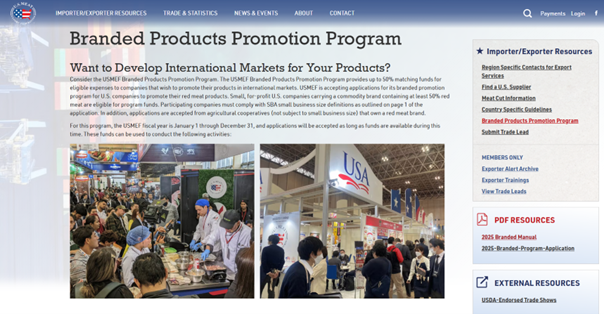
Made in America: Identify Potential Consumers of U.S. Goods and Services
- To determine relevant American goods and services to highlight during a week of celebrating American brands, refer to the list of American Companies exporting to your country or Country Commercial Guides developed by the International Trade Administration to see what sectors are relevant in your market.
- Coordinate with the local American Chamber of Commerce (AmCham) chapter (Global Directory found here) and host a trade fair (where American companies can display at booths), a farmer’s market, or a cooking competition to show off American goods and services in a hands-on way.
- Many associations for U.S. products sold overseas have free public relations tools that American Spaces can amplify in person at an American Space or through social media. For example, the U.S. Soybean Export Council (USSEC), Cotton Council International, or the U.S. Meat Export Federation are major stakeholders in many contexts.
- Show films or photo exhibits connected to American Heroes who paved the way for a product, innovation, or brand that positively impacted your country. For example: George Washington Carver’s impacts on sustainable agriculture.
- Consider streaming Go USA (available via the App Store or Google Play) on a loop to showcase tourism in U.S. cities and attractions.
- Build consumer trust in U.S. goods and services by creating a graphic timeline of the history of U.S. trade with your country and put it on display in the center of your American Space.
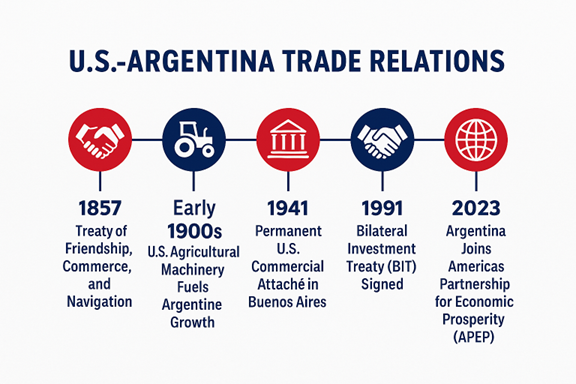
Networking Events: Connect the Dots
- Every November, the Global Entrepreneurship Network (GEN) hosts the Global Entrepreneurship Week. Browse GEN’s Idea Bank for activities to host at the American Space to foster greater collaboration between American businesses and those segments of the local population that American businesses are most eager to connect with.
- Every June, the SelectUSA Investment Summit gives investors from hundreds of countries direct access to speak with local U.S. states on investment opportunities. Host a watch party networking event so potential investors unable to attend the summit can still participate virtually while meeting with embassy staff such as members of the Foreign Agricultural Service and Foreign Commercial Service in person.
- Every January, the Consumer Technology Association (CTA) hosts the Consumer Electronics Show in Las Vegas. American Spaces can host networking events between American tech representatives and those in the local country they seek to connect with (whether supply chain or talent-related). To create a welcoming and collaborative environment, the American Space can place American electronics on display and share resources from CTA’s Tech 101 site with those participating.
- During the 2026 FIFA World Cup and L.A. 2028 Summer Olympics in the United States, host watch parties with photo exhibits of American Heroes in sports.
- American Spaces can foster mutual learning for both American business in U.S. cities and audiences in their Sister City about business opportunities through virtual events. These “Call Your Sister” events can broaden understanding of supply and demand and can also bring in alumni who may have visited the U.S. city to provide additional context. For example, tech entrepreneurs in Miami seeking interns to test a product in Latin America might present their inventions to university students in sister city Bogota, Colombia, via a hybrid event for in-person attendees at an American Space.
- Host career days or field trips to local American-owned businesses that are seeking to hire local talent. Coordinate panels of local employees who discuss what it’s like to work for an American company.
- Partner with local influencers through a variety of mediums (i.e. podcasts, social media) to create campaigns to promote U.S. goods and networking events.
Design “Doing Business with the United States” industry-focused events that create a business-friendly climate for U.S. companies.
- To increase access to information about American business and trade, host “mythbuster” events (for example through trivia nights) or social media campaigns to dispel inaccurate rumors.
- Develop English courses focused on industries where U.S. businesses are aiming to expand hiring. Courses can focus on vocabulary that is specific to that industry, such as English for tourism operators or call-center employees. Ask the Regional English Language Office (RELO) for recommendations.
- Bring in U.S. experts, AmCham representatives, and/or embassy officials to discuss recent changes in U.S. or local policies that affect U.S. business positively or negatively. Examples could include intellectual property laws that impact U.S. creative economies (see also the Intellectual Property Program Toolkit for American Spaces) or local content requirements which can limit U.S. companies’ ability to subcontract with American vendors for services.
- In countries with critical minerals (see the Minerals Security Partnership page for a list of specific countries currently involved in one initiative), invite embassy representatives or geological experts to speak on panels targeting local businesses, government, and students explaining how responsible sourcing of critical minerals strengthens both the U.S. and the local economy.
- Host hackathons sponsored by U.S. tech companies to help resolve local issues faced by American business (in partnership with business schools or engineering schools).
- Utilize Marginal Revolution University’s International Trade interactive modules to broaden understanding of the mutual benefits of trade with the United States.
BEST PRACTICES
- A highly targeted audience can help accomplish a specific commercial objective.
- Coordinate closely across the interagency, especially with post’s Foreign Commercial and Agricultural Services and Econ section, to understand USG priorities in your country.
- For embassy staff: Consider joining working groups with relevant section and agencies to identify barriers and audiences and develop Public Diplomacy campaigns to support specific mission objectives.
POSSIBLE TARGET AUDIENCES AND PARTNERS
- Government officials
- American Chamber of Commerce
- U.S. export or local import councils
- Overseas Security Advisory Council
- City councils
- Business journalists
- U.S. diaspora influencers
- U.S. businesses
- Lawmakers
- Industry experts
- Targeted alumni
DISCUSSION QUESTIONS
- How do you think American companies differ from companies from other countries doing business in this country?
- What values do the United States and this country share when doing business?
- What would make a good “joint trade idea” between our cities or countries?
- What myth or assumption about a U.S. business or U.S. trade has changed for you today?
DISCLAIMER
The views expressed in these links and resources do not necessarily reflect those of the U.S. government.
Updated August 2025

